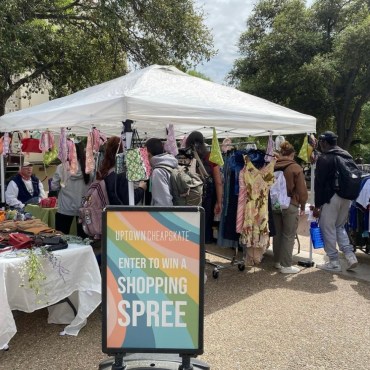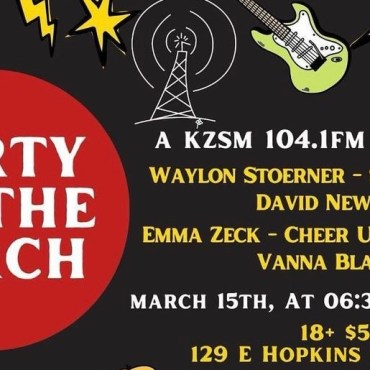Listeners:
Top listeners:
-
play_arrow
KTSW 89.9

By Timia Cobb
Web Content Contributor
Everyone knew how much I loved Glee in high school, so I started watching Glee again.
It had the popularity equivalent to Game of Thrones, but lacked the dragons, nudity, war and most of Glee’s viewers were pre-teens. Nevertheless, if you weren’t watching Glee, you were missing out.
I was mainly attracted to Glee because it was publicized as a show that represented the outcasts, the theatre kids, the choir kids and more, which was inspiring for a kid like me who spent almost every year in choir during high school and participated in a dancing/singing acapella group.
However, now that I am older and have re-watched Glee, I can see how the show is way too problematic.
Glee repeatedly made homophobic and transphobic remarks in almost every season, pushed talented POC actors to the side, treating them like accessories instead of characters who deserved storylines and romanticized adult relationships with minors.
Rachel Berry, played maybe too well by Lea Michelle, is obviously the main character of the show. If you didn’t think so, she would have a tantrum and yell about how she is the main character.
This is one of the biggest issues about the show. It made a narcissistic, selfish, insanely entitled, power-hungry person seem like they deserved to be a star, when in actuality, a lot of things were handed to Berry.
Berry got pretty much every solo when she was a part of the New Directioners glee club. And when anyone tried to get a role she wanted, she would panic, plot against them and refuse to be a team-worker unless people stopped everything to give her the attention she desperately wanted and begged her to sing again. Berry had talent, but in reality, her talent will never outshine the horrible person she was.
Others in the cast such as Kurt Hummel (played by Chris Colfer), Mercedes Jones (played by Amber Riley), Santana Lopez (played by Naya Rivera) and Tina Cohen-Chang (played by Jenna Ushkowitz) were all mistreated by Berry, when really any of them could have been considered better than her if given the same amount of attention Berry had gotten.
Over the span of six seasons, Berry repeatedly made racist remarks towards her peers (which she thinks she can do because she is Jewish), got a teacher fired by faking a sexual assault story, continuously criticized her fellow glee club members by reminding them that they aren’t as good of a performer as her and continuously throw her friends under the bus.
While Berry was off gallivanting as the main character, the only POC actresses were repeatedly pushed to the side and used as accessories when their storylines could have been very entertaining if given as much attention.
For example, Cohen-Chang should have been given more solos and air-time. Instead, she was pushed to the back as a forever side-character who was repeatedly told that she would have her time when she was a senior, but that never happened.
In the first episode of Cohen-Chang’s senior year, freshman Marley (played by Melissa Benoist) was introduced as the “new Rachel” and sang lead for most of the songs. The only time I really recall Cohen-Chang singing close to lead was when the New Directioners sang “Gangnam Style” by Korean artist Psy, which had some racist undertones and could be seen as her being used as the “token Asian girl.”
Speaking of tokens, the way Jones and Unique Adams (played by Alex Newell) were treated was inexcusable and wrong. Jones carried the New Directioners and was never acknowledged for that. Instead, she was belittled and made to think that she didn’t deserve the solos that were practically handed to Berry. And when she spoke up about this, she was seen as a drama queen.
Jones becomes a huge part of the show and one of Glee’s most lovable characters, but when Adams is introduced into the show, it makes it seem as though both Jones and Adams were just loud-singing, sassy-remarking accessories.
During Adams’s entire first season, she was pushed aside and was only involved when she speaking AAVE, singing or defending her gender.
Adams clearly becomes a buffer to replace Jones while she is away, reducing both of them to the status of tokens. Bringing Adams to Glee was a slap in the face to Jones because it was as if the writers were saying, “we can easily replace you with any other loud-singing black girl we can find.”
Not only was Adams disrespected for her race, but continuously for her gender as well. In the show, Adams is proud to identify as a black woman and can be classified as transgender, but she is questioned by a fellow glee member Ryder Lynn (played by Blake Jenner).
The writers could have easily used this situation to teach about how people are different and transphobia is bad, which they initially did, but kept reintroducing more issues concerning Adams’s gender, making things awkward and very transphobic.
Even after the racism, mistreatment, transphobia and more issues, Glee somehow had the time to fit in adult and minor relationships.
In season four, Kitty (played by Becca Tobin) and Puck (played by Mark Salling) start a relationship. In the show, they are at least five years apart with Kitty being 16 and Puck being 19 or 20, seeing he failed a year of high school. This might not seem like a huge problem, but in 2015 Salling began trial for being in possession of child pornography, which makes his character’s relationship with Kitty scary and uncomfortable.
Even after ranting about how problematic Glee is, I do understand that when it first aired it gave many people who felt like they didn’t have representation a voice. Glee had its good moments, a highly diverse cast and was truly a good show, but it was definitely far from perfect.
Featured image by Timia Cobb.
Share this:
- Click to share on Twitter (Opens in new window)
- Click to share on Facebook (Opens in new window)
- Click to share on Tumblr (Opens in new window)
- Click to share on Pinterest (Opens in new window)
- Click to share on Reddit (Opens in new window)
- Click to email a link to a friend (Opens in new window)
- Click to print (Opens in new window)
Entertainment Glee LGBTQ+ Problematic Timia Cobb
Similar posts
This Blog is Propery of KTSW



Post comments (0)